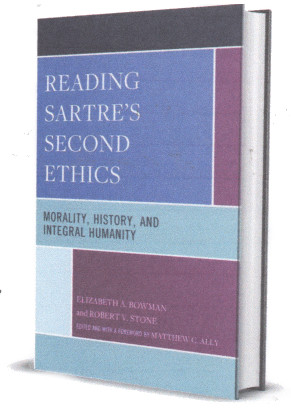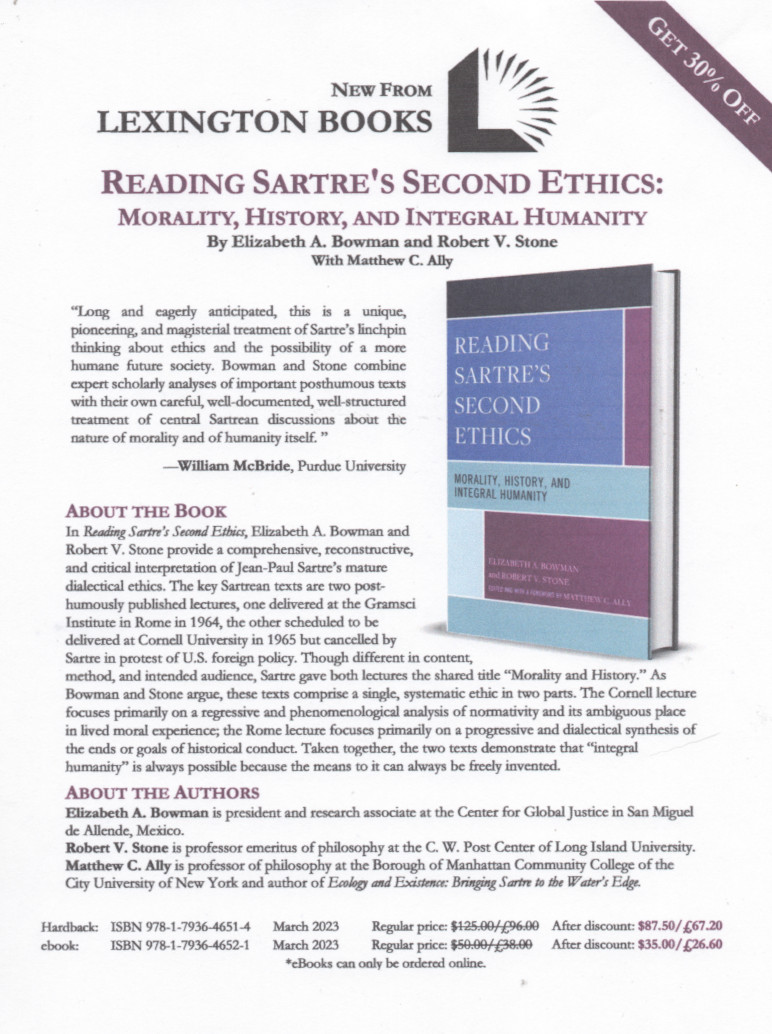Betsy Bowman and Bob Stone, co-founders with the late Cliff DuRand of the Center for Global Justice, have just published their long-awaited book on Jean-Paul Sartre’s second ethics entitled Reading Sartre’s Second Ethics.
Capping a 40 years’ study of the French existentialist, Jean-Paul Sartre, Bowman and Stone hold that his pivotal ethics of 1964-5 speak directly to us in our epoch.
 In August 1945 atomic bombs ended World War II; improved bombs still threaten humans and life itself - more credibly today. In October of 1945, in part of his first ethics titled Existentialism is a Humanism, Sartre held that since we are defined neither by God nor genetics but by our own free historical acts, we ought to make ourselves anew.
In August 1945 atomic bombs ended World War II; improved bombs still threaten humans and life itself - more credibly today. In October of 1945, in part of his first ethics titled Existentialism is a Humanism, Sartre held that since we are defined neither by God nor genetics but by our own free historical acts, we ought to make ourselves anew.
But whatis history and how is it made? Answers to these questions might help us re-direct it. The 1945 ethics had offered none. At least Sartre diagnosed our problem in 1960 with Critique of Dialectical Reason: to date we’ve produced ourselves indirectly as “products of our product,” serving systems of capitalism and Stalinism.
Cuba’s 1959 revolution and Algeria’s 1961 independence victory moved Sartre to a new global ethics. Resisters to Nazi and French torture (in Algeria) had unveiled the power of ethics to alter history. They had confirmed Kant’s insight that if we morally ought to do act x, then we can do it, since we can’t be duty bound to do the impossible.
Our needs posit “integral humanity” as “unconditionally possible” end. “The entire human group” alters nature to directly restore integrity to all (meet needs) without reanimating a system. As end it is “synthetic unity” of all means to itself; hence it is a criterion for avoiding all anti-human means that might “explode” the unity they would enter.
But Cuban and Algerian liberations were not followed by anything like the rotating uprisings that zig-zagged round the planet after the January 1968 Tet offensive sparked that year’s global rebellion. Discerning global repression behind President Johnson’s bombing of North Vietnam in February 1965, Sartre wisely shelved his second ethics.
In 1986 Simone de Beauvoir wrote us that in her view the ethics of 1964-5 was “the culminating point” of Sartre’s ethical thought. In 1947, rejecting both U.S. capitalism and Soviet Stalinism, Sartre had called for a neutral Europe to lead the world to peace. To close class divisions he called for a new socialist humanism. Against anti-Semitism and anti-Black racism he emphasized such a humanism’s inclusiveness. In 1952 he traced de-humanization of gays to projection by fearful homophobes. And his many writings on colonialism and imperialism called for something like at least a global debate on realizing integral humanity.
Bowman and Stone ask if their book on Sartre’s second ethics coincidentally appears just when its call for a new global uprising to save human and other life on earth is most pertinent. In fact, as the USA’s own global empire starts a decline like those of Britain and France, leaking moral credibility in its practice of torture, we wonder if the second ethics is more pertinent than when it was written in 1964-5?
CLICK HERE to read the text of this presentation


